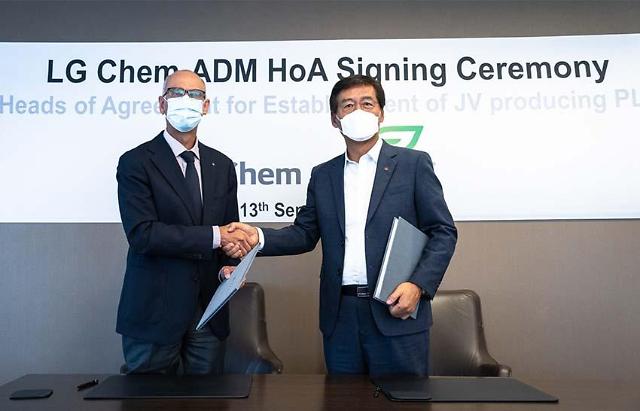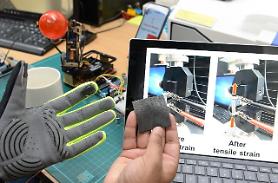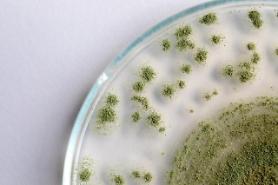
[Courtesy of LG Chem]
SEOUL -- Archer Daniels Midland, a major American grain processing company, agreed with LG Chem, a chemical unit of South Korea's LG Group, to set up a joint factory in the United States for the production of corn-based raw materials for bioplastics that can be made from agricultural by-products and also from used plastic bottles and other containers using microorganisms.
LG Chem said it has signed a heads of agreement with Archer Daniels Midland (ADM) for the establishment of a lactic acid and polylactic acid (PLA) joint venture in a ceremony at ADM's headquarters in Chicago. A definitive agreement would be signed in the first quarter of 2022 to build the PLA plant with an annual capacity of 75,000 tons and a LA production plant by 2025.
PLA is a biodegradable plastic based on lactic acid that is produced by fermenting and refining glucose extracted from corn and is mainly used for food packaging containers and tableware. It comprises an eco-friendly material that is naturally decomposed in several months by microorganisms under certain conditions.
ADM has a technical advantage in the production of glucose, the most important raw material for bio-based chemicals and fermentation technology using glucose. LG Chem said that through the joint venture, the company would be allowed to integrate renewable biomaterials into the development of various high-added-value products and secure a stable supply of raw materials and the capacity for the commercial production of high-purity lactic acid.
LG Chem, which is the first company to develop flexible PLA, said it would actively penetrate into the bioplastic market and accelerate the commercialization of its biodegradable plastic. "The establishment of a joint venture with AMD will be the start of a new journey that goes beyond simple cooperation to lead the transition to a sustainable business structure for the benefit of the environment and society," LG Chem CEO Shin Hak-cheol said in a statement on September 14.
In October 2020, LG Chem developed a new biodegradable material using corn-based glucose and crude glycerol that can realize mechanical properties equivalent to synthetic resins for the first time in the world. LG Chem's new material can be applied to plastic bags, air cap buffers, disposable cups, foaming products and mask felts.
The South Korean company has also tried to commercialize polybutylene adipate terephthalate (PBAT), a biodegradable random copolymer that makes it ideal for combination with other biodegradable polymers. Many degradable plastic products have failed to attract attention because of their weak durability, while some bioplastics are very brittle compared to those made from fossil fuel.
LG Chem and ADM would actively cooperate in the joint research and development of biomaterials that can be applied in the eco-friendly and sustainability sector. In 2019, the two companies signed a joint development agreement to secure mass production technology for eco-friendly bio-acrylic acid, which is mainly used to produce the superabsorbent polymer, a raw material for diapers and various hygiene products.
"Our cooperation with LG Chem will create a new opportunity for growth in solutions based on bio-based materials and the enhancement of value for our customers," ADM CEO Juan Luciano was quoted as saying.
Copyright ⓒ Aju Press All rights reserved.



![[FOCUS] SK Chemicals seeks early commercial production of flexible polylactic acid](https://image.ajunews.com/content/image/2021/04/23/20210423165129647656_278_163.jpg)